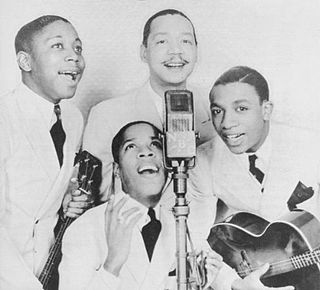
The Ink Spots were an American vocal jazz group who gained international fame in the 1930s and 1940s. Their unique musical style presaged the rhythm and blues and rock and roll musical genres, and the subgenre doo-wop. The Ink Spots were widely accepted in both the white and black communities, largely due to the ballad style introduced to the group by lead singer Bill Kenny.

Van and Schenck were popular United States entertainers in the 1910s and 1920s: Gus Van, baritone, and Joe Schenck (pronounced "skenk"; born Joseph Thuma Schenck,, tenor. They were vaudeville stars and made appearances in the Ziegfeld Follies of 1918, 1919, 1920 and 1921. They made numerous phonograph records for the Emerson, Victor, and Columbia record companies.

Papal Count John Francis McCormack, KSG, KSS, KHS, was an Irish tenor celebrated for his performances of the operatic and popular song repertoires, and renowned for his diction and breath control. He was also a Papal Count. He became a naturalised American citizen before returning to live in Ireland.
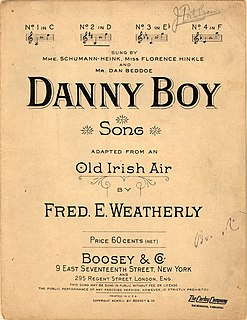
"Danny Boy" is a ballad, written by English songwriter Frederic Weatherly in 1913, and set to the traditional Irish melody of "Londonderry Air".

Polk Miller was a musician and entertainer from Richmond and Bon Air, Virginia. He was also a pharmacist and the founder of Sergeant's Pet Care Products, Inc.

Arthur Francis Collins was an American baritone who was one of the most prolific and beloved of pioneer recording artists, regarded in his day as "King of the Ragtime Singers".
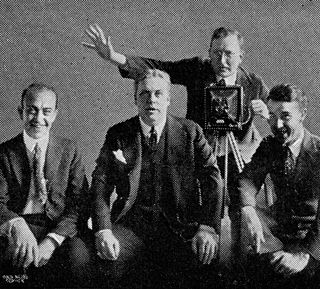
The Peerless Quartet was an American vocal group that recorded in the early years of the twentieth century. They formed to record for Columbia Records, where they were credited as the Columbia Quartet or Columbia Male Quartet. From about 1907, when they began to record for record labels other than Columbia, they were more widely known as the Peerless Quartet.
"Corrine, Corrina" is a 12-bar country blues song in the AAB form. "Corrine, Corrina" was first recorded by Bo Carter. However, it was not copyrighted until 1932 by Armenter "Bo Carter" Chatmon and his publishers, Mitchell Parish and J. Mayo Williams. The song is familiar for its opening verse:
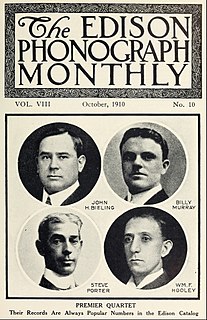
The American Quartet was a four-member vocal group that recorded for various companies in the United States between 1899 and 1925. The membership varied over the years, but the most famous line-up — comprising John Bieling, Billy Murray, Steve Porter (baritone), and William F. Hooley (bass) — recorded for the Victor Talking Machine Company from 1909 to 1913. The same group of singers also recorded for Edison Records as the Premier Quartet, and for that and other labels as the Premier American Quartet. From 1912 to 1914 the quartet also recorded with countertenor Will Oakland as the Heidelberg Quintet.
"Just a Closer Walk with Thee" is a traditional gospel song that has been performed and recorded by many artists. Performed as either an instrumental or vocal, "A Closer Walk" is perhaps the most frequently played number in the hymn and dirge section of traditional New Orleans jazz funerals. The title and lyrics of the song allude to the Biblical passage from 2 Corinthians 5:7 which states, "We walk by faith, not by sight" and James 4:8, "Come near to God and He will come near to you."

"There's a Long, Long Trail" is a popular song of World War I. The lyrics were by Stoddard King (1889–1933) and the music by Alonzo "Zo" Elliott, both seniors at Yale. It was published in London in 1914, but a December, 1913 copyright for the music is claimed by Zo Elliott.

"(You're My Heart's Desire, I Love You) Nellie Dean" is a sentimental ballad in common time by Henry W. Armstrong, published in 1905 by M. Witmark & Sons of New York City. The original sheet music is scored in B-flat major for voice and piano and marked andante moderato.

"The Sunshine of Your Smile" is a British popular song published in London in 1913 just before the First World War by Francis, Day and Hunter. The lyrics were by Leonard Cooke and the music by Lilian Ray. It became a top ten hit in the UK Singles Chart in 1980, sung by Mike Berry.

"I Hear You Calling Me" was a British popular song published in London in 1908 by Boosey & Co. The lyrics were by Harold Lake and the music by Charles Marshall. The song became a bestseller for the tenor John McCormack.

Oscar Seagle was a prominent musician and music teacher active in the early 20th century. He founded the Seagle Music Colony in Schroon Lake, New York.

"When My Ships Come Sailing Home" is an American song composed by Francis Dorel and lyrics by Reginald Stewart. The sheet music for the song was distributed as early as 1913 by Boosey & Co, one of the forerunners of the Boosey & Hawkes publishing firm.

"The Garden of Your Heart" is a song composed by Francis Dorel and Edward Teschemacher. The first and only known recording was by American Tenor Charles Harrison in 1916 for Columbia Records.
"Beautiful Isle of Somewhere" is a song with words by Jessie Brown Pounds and music by John Sylvester Fearis written in 1897. The song gained huge popularity when it was used in William McKinley's funeral. It was a staple of funerals for decades subsequently, and there are dozens of recorded versions.
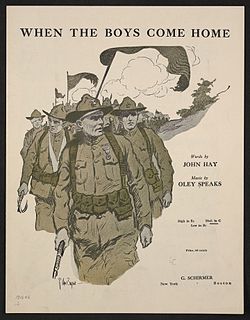
"When the Boys Come Home" is a World War I song. It was first published as sheet music in 1915 with music by Oley Speaks and lyrics by John Hay.
"Calling Me Home" may refer to:
















